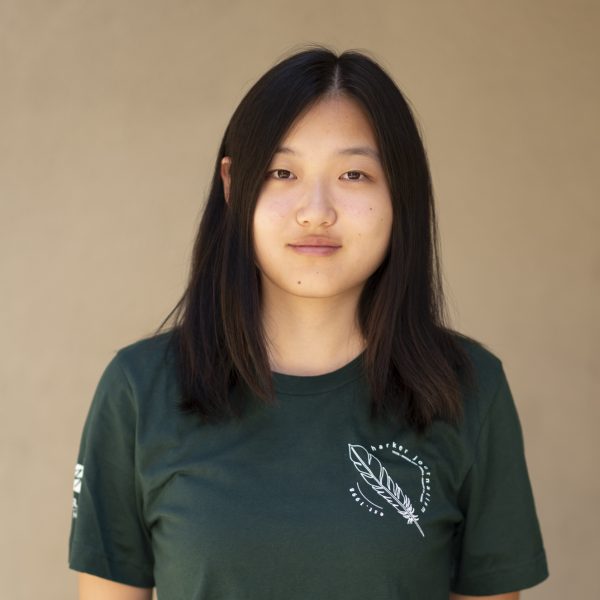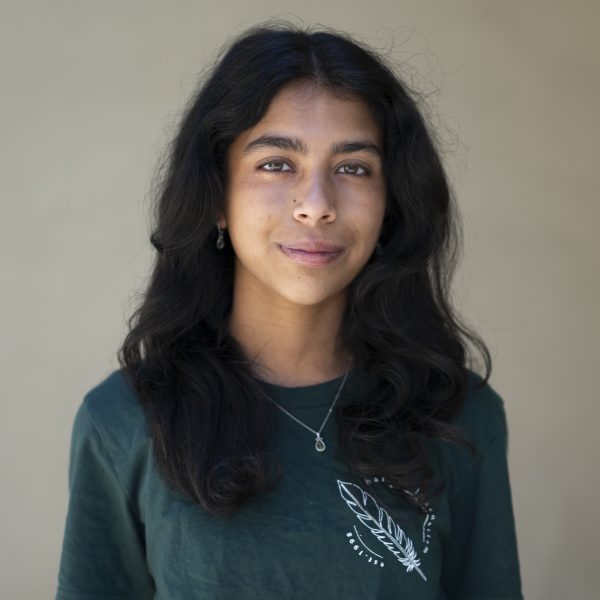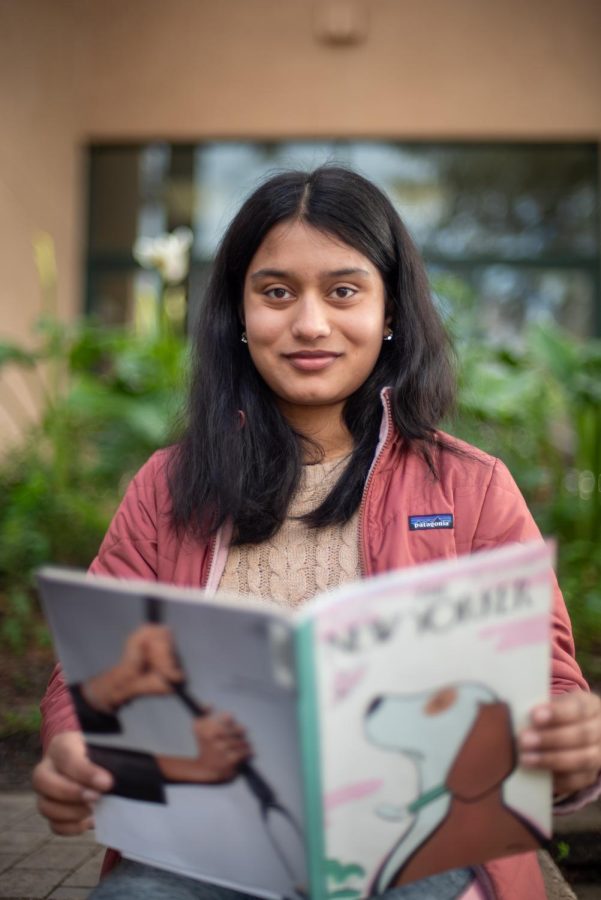Humans of Harker: Pursuer of purpose
Amruta Dharmapurikar uplifts her community with authentic enthusiasm
“To me, you have to make meaning in your life. You can’t just find meaning; it’s not a thing that’s just waiting for you to grab. You have to actively go everyday to choose what will be meaningful to you and work very hard to make sure you get that meaning. The activities I choose to do, I work every day to make sure that they are as meaningful to me as possible, that I care about them,” Amruta Dharmapurikar (12) said.
As an avid news-reader since middle school, Amruta Dharmapurikar (12) first noticed the differing perspectives presented by each news source when she began jumping from one to the other. The way each site suffered from biased reporting unsettled Amruta, who had previously trusted a single source for information. Not content to merely frown at the issue, Amruta launched into action: using machine learning and information theory, she created a program that could quantify the amount of editorialization in each news source.
Amruta describes her work as a “passion project,” one of many she has pursued throughout her time in high school. Her ideas arise from problems she observes in the world around her, including those at school. For example, noticing that students often struggle to throw trash into the correct bins in accordance with Harker’s wet-dry system, she developed a trash sorter that could automatically divide waste items using machine learning.
“I truly do things when I feel like I should be doing them,” Amruta said. “I have to feel this urge or this need to do something. Then, when I do it, I will really believe what I do and approach it with full force.”
Upper school computer science teacher Marina Peregrino, who taught Amruta AP Computer Science in freshman year and also advises AI Club, recalls the discussions she held with Amruta about various AI projects. Peregrino highlighted Amruta’s excitement to learn about computer science and eagerness to use her skills to solve problems.
“She was a mature kid, but she still has that sense of joy and playfulness,” Peregrino said. “I like to see that she really hung on to her enthusiasm, she still likes what she likes, [and is] not so exhausted that she doesn’t care about things anymore. I’ve always seen that she’s been interested in computer science and AI. It’s fun to share that joy with someone.”
Of all the issues Amruta has tackled, the one that she feels most drawn to is education. Reimagining former U.S. Secretary of Defense Donald Rumsfeld’s quote, Amruta delineates three categories into which one can categorize knowledge: known knowns, known unknowns and unknown unknowns.
“For us at Harker, we have a lot of known knowns, like we know how to solve [math problems], do math competitions; we know that these competitions exist,” Amruta said. “Or you have known unknowns, like you don’t know how to solve math problems, but you know, if you wanted to, [you] could do it. There’s also unknown unknowns: some people don’t even know math competitions exist.”
Amruta’s mission regarding education centers on uncovering people’s unknown unknowns. In other words, she strives to make students aware of opportunities available to them and provide them with the resources to pursue those opportunities. To realize this goal, in her sophomore year, Amruta founded the organization CuriAIsity. After cold-calling and cold-emailing schools and libraries nationwide, she has succeeded in hosting around ten AI workshops for middle and high school students in the Bay Area and beyond.
During each workshop, Amruta begins by teaching the basics of AI and its applications and then starts the students on a project where they apply AI to a problem they wish to solve. At the end of the session, she presents them with resources to further explore AI, such as summer opportunities or websites with additional content.
“If the students know [these resources] exist, it’s their choice — do I want to pursue this further or not?” Amruta said. “But that first connection is really important to me. I guess the point of education is to make sure that you translate your unknown unknowns to your known unknowns. And then it’s up to you as a person to make your known unknowns, known knowns.”
Close friend Nidhya Shivakumar (12) admires Amruta’s dedication to her pursuits. From the day she met Amruta in sixth grade, when they were the only two girls at Science Bowl practice, Nidhya has admired the depth of Amruta’s knowledge in numerous subjects. Over the years, she has also seen Amruta grow to use her knowledge to benefit others, through her various machine learning projects and CuriAIsity.
“She’s a really caring person, and she truly wants to help,” Nidhya said. “Over the years, she’s become more focused on helping people. She uses all the knowledge that she has gained throughout the years and puts it to good use.”
Through the various activities she has engaged in during high school, Amruta has found a sense of purpose. She chooses endeavors that she finds most worthwhile and devotes herself to maximizing their impact.
“To me, you have to make meaning in your life,” Amruta said. “You can’t just find meaning; it’s not a thing that’s just waiting for you to grab. You have to actively go every day to choose what will be meaningful to you and work very hard to make sure you get that meaning. The activities I choose to do, I work every day to make sure that they are as meaningful to me as possible, that I care about them.”
Upper school English teacher Susanne Salhab, who currently teaches Amruta AP Literature, noticed Amruta’s genuine love of learning. She admires the depth of Amruta’s insights in class and that Amruta seeks to expand her mind with additional reading and conversations outside of class. Looking toward the future, Salhab hopes Amruta will continue to live by this line from “Hamlet”: “This above all; to thine own self be true.”
“For me, listening to her thoughts, listening to her express herself, it’s just a leveling up,” Salhab said. “It’s beautiful that someone wants to learn for the sake of learning. For me as a teacher, as a thinker, as a learner, that’s inspiring, and that’s something I want to emulate. I want to put myself in a position where I’m intellectually growing and where I’m learning and opening myself to the world of ideas, and that’s what Amruta does so well. She’s a learner, a thinker.”

Emma Gao (12) is a co-managing editor for Harker Aquila, and this is her fourth year on staff. This year, she hopes to explore writing a variety of articles...

Kinnera Mulam (12) is the co-editor-in-chief of the Winged Post, and this is her fourth year on staff. This year, Kinnera hopes to get to know all the...




![LALC Vice President of External Affairs Raeanne Li (11) explains the International Phonetic Alphabet to attendees. "We decided to have more fun topics this year instead of just talking about the same things every year so our older members can also [enjoy],” Raeanne said.](https://harkeraquila.com/wp-content/uploads/2025/10/DSC_4627-1200x795.jpg)


















![“[Building nerf blasters] became this outlet of creativity for me that hasn't been matched by anything else. The process [of] making a build complete to your desire is such a painstakingly difficult process, but I've had to learn from [the skills needed from] soldering to proper painting. There's so many different options for everything, if you think about it, it exists. The best part is [that] if it doesn't exist, you can build it yourself," Ishaan Parate said.](https://harkeraquila.com/wp-content/uploads/2022/08/DSC_8149-900x604.jpg)




![“When I came into high school, I was ready to be a follower. But DECA was a game changer for me. It helped me overcome my fear of public speaking, and it's played such a major role in who I've become today. To be able to successfully lead a chapter of 150 students, an officer team and be one of the upperclassmen I once really admired is something I'm [really] proud of,” Anvitha Tummala ('21) said.](https://harkeraquila.com/wp-content/uploads/2021/07/Screen-Shot-2021-07-25-at-9.50.05-AM-900x594.png)







![“I think getting up in the morning and having a sense of purpose [is exciting]. I think without a certain amount of drive, life is kind of obsolete and mundane, and I think having that every single day is what makes each day unique and kind of makes life exciting,” Neymika Jain (12) said.](https://harkeraquila.com/wp-content/uploads/2017/06/Screen-Shot-2017-06-03-at-4.54.16-PM.png)








![“My slogan is ‘slow feet, don’t eat, and I’m hungry.’ You need to run fast to get where you are–you aren't going to get those championships if you aren't fast,” Angel Cervantes (12) said. “I want to do well in school on my tests and in track and win championships for my team. I live by that, [and] I can do that anywhere: in the classroom or on the field.”](https://harkeraquila.com/wp-content/uploads/2018/06/DSC5146-900x601.jpg)
![“[Volleyball has] taught me how to fall correctly, and another thing it taught is that you don’t have to be the best at something to be good at it. If you just hit the ball in a smart way, then it still scores points and you’re good at it. You could be a background player and still make a much bigger impact on the team than you would think,” Anya Gert (’20) said.](https://harkeraquila.com/wp-content/uploads/2020/06/AnnaGert_JinTuan_HoHPhotoEdited-600x900.jpeg)

![“I'm not nearly there yet, but [my confidence has] definitely been getting better since I was pretty shy and timid coming into Harker my freshman year. I know that there's a lot of people that are really confident in what they do, and I really admire them. Everyone's so driven and that has really pushed me to kind of try to find my own place in high school and be more confident,” Alyssa Huang (’20) said.](https://harkeraquila.com/wp-content/uploads/2020/06/AlyssaHuang_EmilyChen_HoHPhoto-900x749.jpeg)



